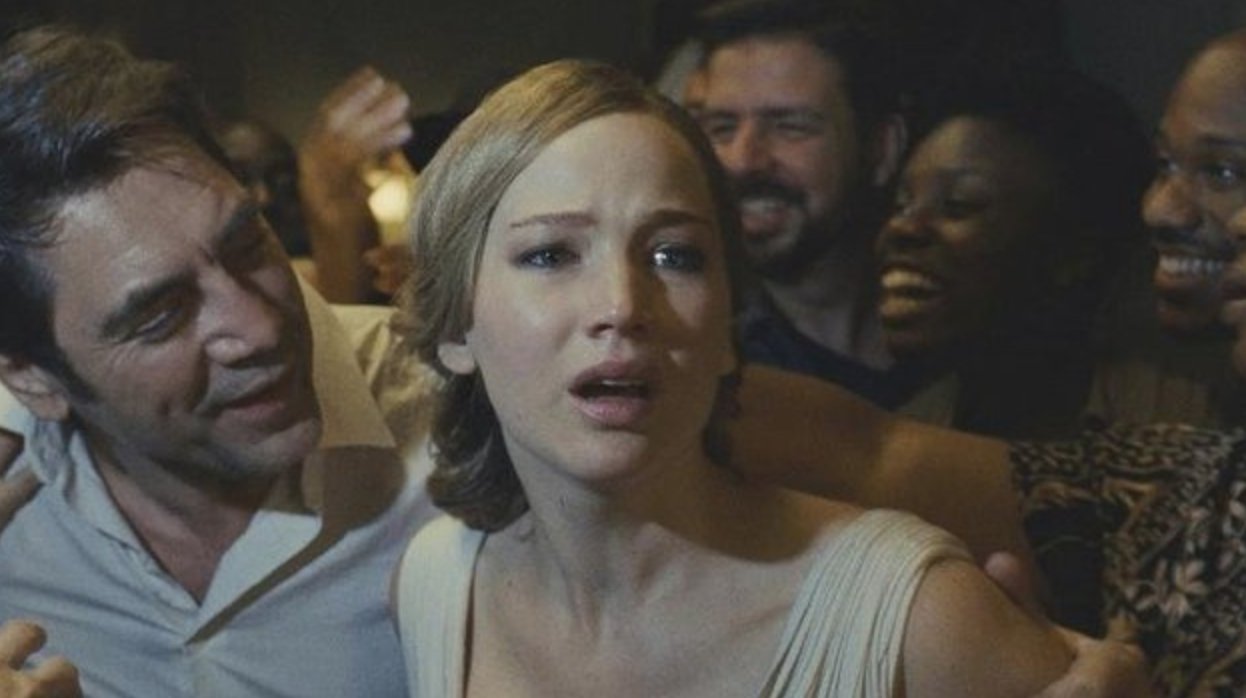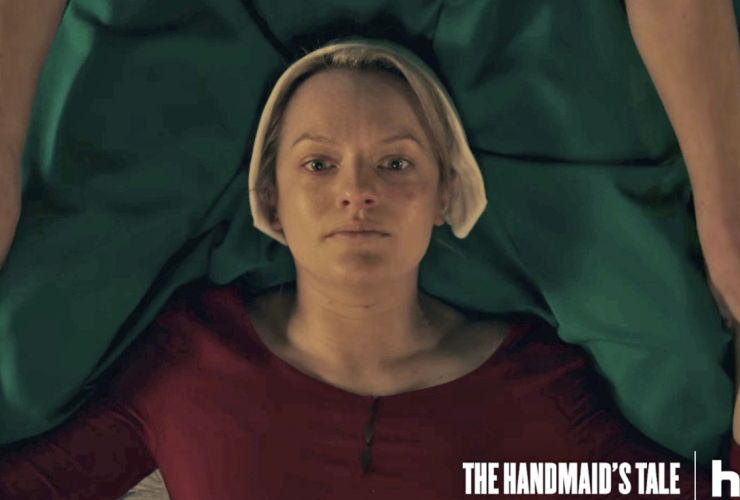Support journalism that lights the way through the climate crisis
Editor's Note: This piece contains spoilers for mother!, a new film by Darren Aronofsky, and contains disturbing content that may not be appropriate for all readers.
I am a fan of Darren Aronofsky. Requiem for a Dream is one of my all-time favourite films and I loved Black Swan. Dark, understated films are my thing, and naturally I’m drawn to Aronofsky’s unique storylines and ability to capture human tragedy. Needless to say I was excited about his new movie mother!, until I actually saw it. He’s lost me on this one.
mother! is a story centred on Him (Javier Bardem), a poet suffering from writer’s block, and his young wife Mother (Jennifer Lawrence), who live in a newly-restored Victorian-style home in the blissful countryside. Mother is a graceful, earthy woman with great awareness of the state of the house, envisioning a beating heart within the walls. Their idyllic lives are turned upside down when a stranger arrives, marking a downward spiral of insanity, brutality, and destruction.
Scenes of manic insanity
The stranger who starts this parade of horror is a deranged-looking Ed Harris, credited simply as Man, who mistakes the home as a bed and breakfast. To Mother’s dismay, her husband is all too eager to welcome Man into their home and soon they are chatting like old friends. The next morning, Mother’s anxiety grows as Man’s wife arrives. Michelle Pfeiffer plays Woman, an obnoxious drunk who asks intimate questions about Mother’s personal life while acting strangely comfortable in the home. Later, Man and Woman’s two sons arrive and immediately start a family blowout over Man's changed will, leading to a bloody, violent outburst.
it’s just never enough. https://t.co/8WCqd9F3iy #mothermovie pic.twitter.com/WfflkkkB9b
— mother! (@MotherMovie) September 22, 2017
A pretentious mess and mockery
At this point in the film I confirmed my suspicion that Aronofsky is making a mockery of Christian theology and showing how he believes that religion is leading to the destruction of Mother Earth. Already there have been several allegories all pertaining to The Book of Genesis and the Creation story. Him is God; Mother is Earth; Man and Woman are Adam and Eve; the brothers are Cain and Abel; there is a frog in the film symbolizing one of the Plagues of Egypt; and finally we have the Great Flood represented by a burst water pipe because sure, why not. This is where the film becomes a pretentious mess and loses any hope of meaningful connection with an audience.
The second half of the film continues the religion-is-bad campaign. After Him's writing block vanishes, he immediately writes and publishes a new masterpiece, drawing in a crowd of devoted fans. People start stealing bits and pieces of Him’s belongings, and the crowd is clamoring to speak to Him. Expressing her indignation at the appalling behavior around her, one person tells Mother, “The poet says it’s everyone’s house!” It’s apparent that Aronofsky is disgusted with how people are treating the Earth and is expressing that through this exhibitionist frenzy of a film.
Depicts only humanity's faults
The religious symbolism is relentless. As the crowd devolves into manic insanity, we see a large mural of Him where a priest is giving a sermon and rubbing a cross of ash on devotees’ foreheads, satirizing Catholic mass on Ash Wednesday. A war breaks out, a violent clash with police occurs, and the entire time Mother scurries from room to room watching helplessly as the house she has lovingly tended to dies (literally, she checks on the house’s heartbeat and finds it is dying). Religion causes war, war destroys the earth... thanks Darren, we didn’t realize that. The rest of the movie depicts hysteria that culminates in death, destruction and borderline unwatchable horror-film bravado.
While the movie certainly comments on how human beings inflict horror upon the Earth — war via religion and environmental destruction — Aronofsky does not let up and uses that allegory over and over and over. Like I said, we get it, humans are bad. But it is pretentious and apathetic to make a movie depicting only humanity’s faults and not bothering to scratch the surface of why people turn to religion, never mind even hint at one of humanity’s more pleasant attributes. Human beings are here; we cannot undo our own creation and unless Aronofsky is advocating a worldwide mass suicide than we need to think creatively about how to actually minimize our impact on the Earth while still allowing ourselves to live here.

Worthy theme of forgiveness
All that being said, there is one aspect of the film I did like. Growing up in a Catholic education system made me acutely aware of religion’s power and I enjoy a good satire of religious fanatics every now and then. One central thesis to religion is the concept of God’s forgiveness, which is mentioned several times in the film. When Man and Woman break a mysterious crystal (marking the Fall of Man), Him tells Mother “we must forgive.” When crowds take over the house and break the kitchen sink that results in a flood, again Him tells Mother to forgive them. Even when war breaks out, people are being summarily shot, and murder and violence abounds, Him advocates forgiveness. It is when these savage ingrates commit an unspeakable horror that Mother decides enough is enough and burns the house to the ground.
This calls into question the concept of God’s forgiveness; if, hopefully not when, people destroy the Earth beyond recognition, whose forgiveness matters more — God’s or Mother’s? What do we prioritize more — spiritual redemption or Mother Earth’s love and comfort? Wars fought in the name of an amorphous God destroy the Earth, and I understand (at least, I think I understand) what Aronofsky is trying to say here. We sacrifice the earth for God time and time again, and perhaps one day Mother Earth will just shake us off like a bad case of fleas.
Why blame Christianity?
mother! is not for the faint-hearted. Some of the images are incredibly disturbing and stomach churning. After it’s release, Aronofsky explained the script was the result of a rage and anger he felt about how the world was being treated, and I assume he wrote and directed this film to warn us about our relentless consumption and blatant disregard for our planet. I understand the impotent rage and anger he speaks of. I’ve lived in Asia for almost two years and I can attest to the extreme pollution and waste that is choking the environment. What I don't understand is why he chose to blame Christianity and war for environmental degradation. Last time I checked, it wasn't in the name of God that consumers pumped 40 billion tons of carbon dioxide into the atmosphere last year. That's a great deal more threatening to the environment than Christians are.
Overall, I liked the message. What I did not like was the elitist manner of his delivery — a surreal, nightmare-ish world where only enlightened fans “get it” and the rest of us are left scratching our heads rather than discussing the important message. We had to dissect the storyline to find the message, and even then there are a number of messages to choose from. mother! is an allegory for feminism underneath millennial patriarchy. It’s about immigrants and welfare recipients, the far right and neo-Nazis. It’s about being married to an egocentric artist suffering from writer’s block. What I am choosing to believe it’s about, for the purposes of writing about it, is Christian theology and how it’s ultimately destroying Mother Earth.
Aronofsky made a really interesting point after mother! premiered when asked about the film setting. “Everyone can identify with someone who can go to your house and throw a piece of garbage on your floor or burn a hole in your carpet with a cigarette,” he said. “But they don’t understand when you throw a piece of paper out on the street.” Now that’s a good message. It's too bad that Aronofsky alienated an entire audience (seriously, it was a box office flop) by making a gross, bizarre movie that only half examines that specific point.
As for me, the conflicted fan, I’ll go rewatch Requiem and pretend this one never happened.






Comments